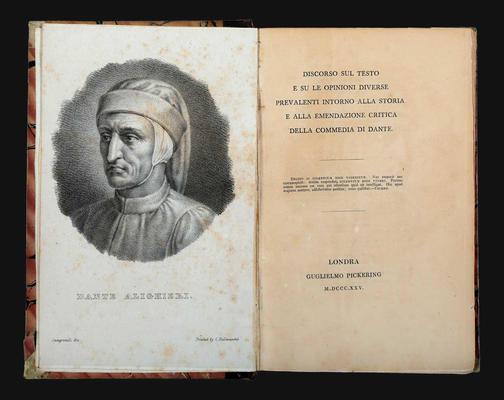Ugo Foscolo
Discorso sul testo e su le opinioni diverse prevalenti intorno alla storia e alla emendazione critica della Commedia di Dante...
London, Guglielmo Pickering, 1825 (at the end: Londra, presso Tommaso White, Crane Court).8° (192 x 123mm). xxxi, [1], 435, [1] pages. On the frontispiece, portrait of Dante, by C. Hullmandel after Campanili (light foxing). Contemporary brown half-leather on pastedowns, boards covered with marbled paper. Smooth spine, divided in compartments by gilt fillets, title in gilt lettering. Multicoloured silk bookmark. The lower corner of the upper cover damaged. A very good copy, title-page uniformly browned, foxing and spotting in places.
Provenance: Livio Ambrogio collection.
First edition of the 'Ghibelline' commentary of Ugo Foscolo (1778-1827), expatriated in England in September 1816. "Like a number of expatriates - from Lord Byron to Giuseppe Mazzini and beyond - Foscolo imagined the exiled Dante as an alter ego. As Maurizio Isabella argues, for Italian political exiles of the nineteenth century Dante's experience 'provided legitimacy' for their own condition, dignity to their status, and consolation for their sense of defeat and alienation, thus boosting their patriotic beliefs with the example of a noble forerunner'. Whilst on the run, as a wounded soldier of the Italian National Guard in 1799, Foscolo - combining his interest in Sterne and Dante - had himself taken the name of 'Lorenzo Alighieri'. A few years later, in his best-known poem Dei Sepolcri (1806), Dante appears as 'il Ghibellin fuggiasco' ('the fugitive Ghibelline', I. 174). The phrase heralded the development of Foscolo's own anticlerical 'Neo-Ghibelline' stance, which was would help to win him the sympathies of the Whig Holland House circle during his own exile” (N. Havely, Dante's British Public. Readersand Texts, from the Fourteenth Century to the Present, Oxford 2014 p. 130). The only volume published, of the five planned: for this reason in the copy here presented is lacking – like in the majority of the recorded copies - the half-title referring to the entire editorial series ‘Poeti Italiani Maggiori. Tomo primo'.


